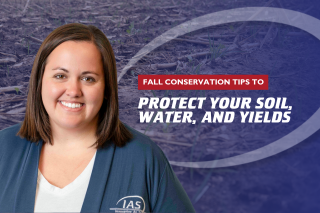Fall Conservation Tips to Protect Your Soil, Water, and Yields
Oct 15, 2025

By Kayla Bergman, IAS Sustainability Lead
Recently, I joined AM 1040’s The Big Show for the "Clean Water Wednesday" broadcast with Agriculture’s Clean Water Alliance (ACWA) to share some key conservation tips as we head into fall. As harvest and field work are underway, it’s a great time to plan for practices that protect your soil, water, and long-term productivity.
Limit or Reduce Tillage
Whenever possible, reduce tillage this fall to help protect your soil structure and minimize erosion. Less tillage means stronger soil biology, better water infiltration, and healthier fields in the long run.
Spread Residue Evenly
Even residue distribution from your combine is essential. It promotes uniform soil warming and moisture next spring, setting the stage for a more even crop stand.
Seed Cover Crops Early
If you’re using cover crops, get them seeded as soon as possible. The earlier you plant, the better chance they have to germinate and have some growth to protect the soil from erosion before winter sets in.
Focus on the 4Rs of Nutrient Management
As you plan your fall fertilizer applications, remember the 4Rs—Right source, Right rate, Right time, Right place. Work closely with your sales agronomist to make sure your nutrient plan supports both crop performance and environmental stewardship.
Update Your Soil Sampling
If it’s been a few years since your last soil test, fall is a great time to collect new samples. Accurate, up-to-date results help ensure you’re applying nutrients efficiently and cost-effectively.
Plan Ahead for Financial Assistance
Many conservation programs that help cover costs require paperwork before you start the practice. Don’t miss out—reach out our sustainability team early to get the process started.
Choose Cover Crops to Match Your Goals
Your cover crop species should align with your specific goals—whether that’s building organic matter, reducing erosion, improving soil health, or managing nutrients. Your agronomist can help you select the right species (or mix of species) or your operation.
Get Local Support
If you’re not sure where to start, check with your local IAS agronomist or a member of the sustainability team. I’m always happy to help you find solutions that fit your farm.